Professional Identity and Practice: Development Plan Report
VerifiedAdded on 2021/02/21
|14
|4128
|54
Report
AI Summary
This report focuses on professional development within the context of a Marketing Manager role at Travelodge Hotel. It explores the significance of ongoing professional development for both employers and employees, emphasizing the enhancement of skills and competencies. The report includes a systematic self-assessment of abilities, skills, and competencies using a SWOT analysis, identifying strengths and weaknesses. It reviews various learning theories and approaches, such as behaviorist, cognitive, and humanist approaches, and learning theories like the Theory of Instruction, B.S. Bloom, and Bandura's Self Efficacy theory. A professional development plan is constructed to enhance chosen skills and competencies. Furthermore, the report discusses the job interview process and its strengths and weaknesses for a suitable service industry role. The report provides insights into the expectations of the employer and the benefits of continuous learning for both the organization and the individual.
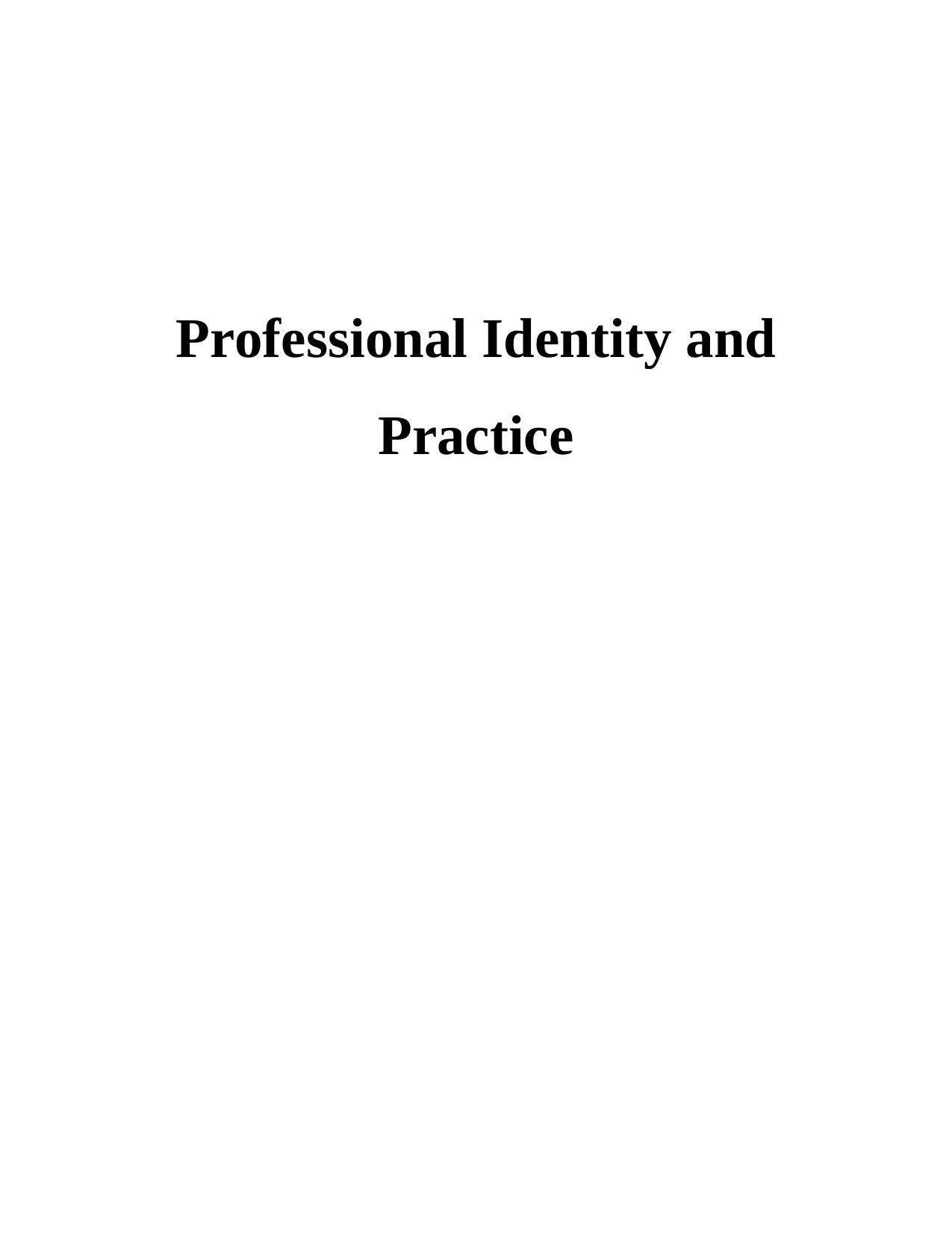
Professional Identity and
Practice
Practice
Paraphrase This Document
Need a fresh take? Get an instant paraphrase of this document with our AI Paraphraser
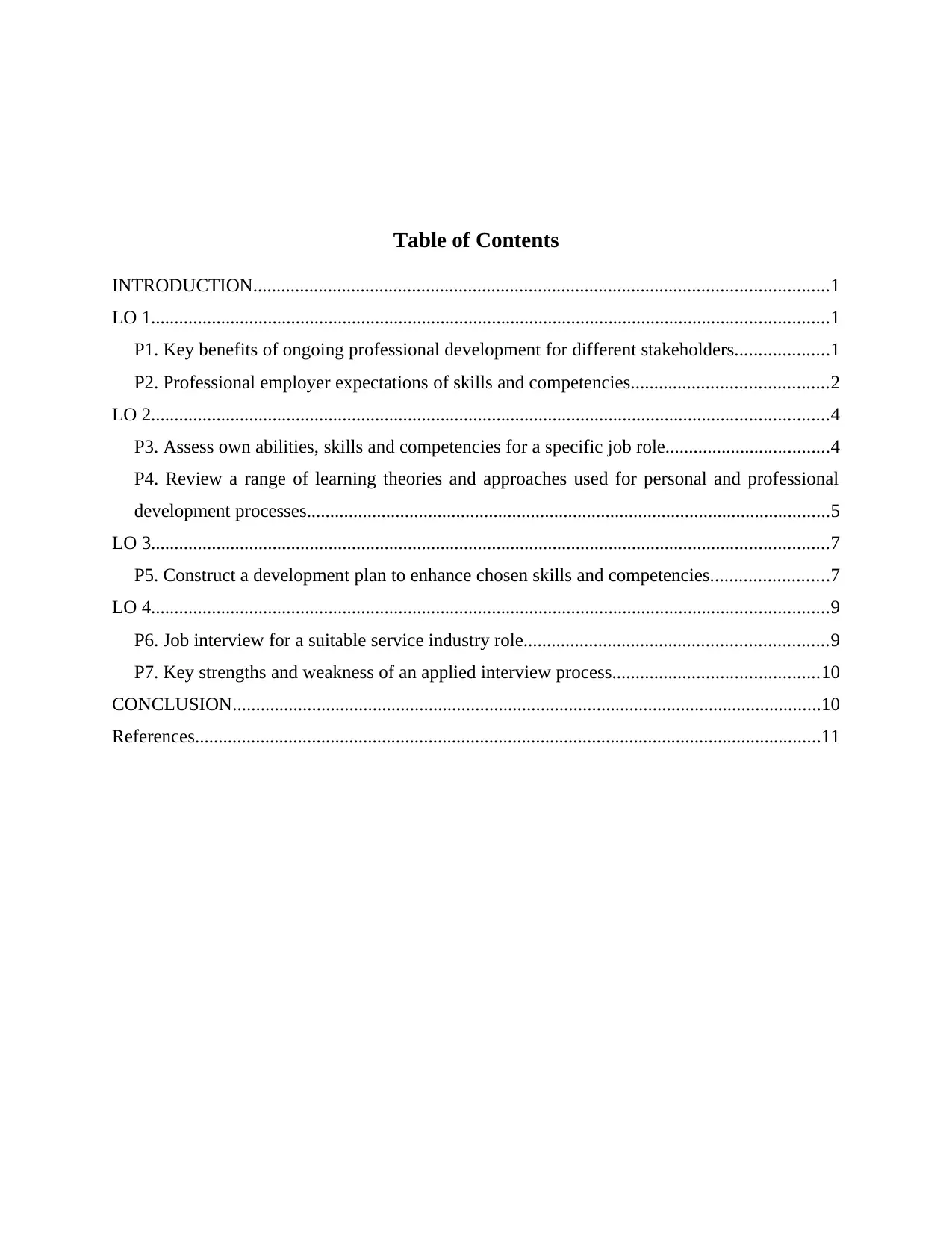
Table of Contents
INTRODUCTION...........................................................................................................................1
LO 1.................................................................................................................................................1
P1. Key benefits of ongoing professional development for different stakeholders....................1
P2. Professional employer expectations of skills and competencies..........................................2
LO 2.................................................................................................................................................4
P3. Assess own abilities, skills and competencies for a specific job role...................................4
P4. Review a range of learning theories and approaches used for personal and professional
development processes................................................................................................................5
LO 3.................................................................................................................................................7
P5. Construct a development plan to enhance chosen skills and competencies.........................7
LO 4.................................................................................................................................................9
P6. Job interview for a suitable service industry role.................................................................9
P7. Key strengths and weakness of an applied interview process............................................10
CONCLUSION..............................................................................................................................10
References......................................................................................................................................11
INTRODUCTION...........................................................................................................................1
LO 1.................................................................................................................................................1
P1. Key benefits of ongoing professional development for different stakeholders....................1
P2. Professional employer expectations of skills and competencies..........................................2
LO 2.................................................................................................................................................4
P3. Assess own abilities, skills and competencies for a specific job role...................................4
P4. Review a range of learning theories and approaches used for personal and professional
development processes................................................................................................................5
LO 3.................................................................................................................................................7
P5. Construct a development plan to enhance chosen skills and competencies.........................7
LO 4.................................................................................................................................................9
P6. Job interview for a suitable service industry role.................................................................9
P7. Key strengths and weakness of an applied interview process............................................10
CONCLUSION..............................................................................................................................10
References......................................................................................................................................11
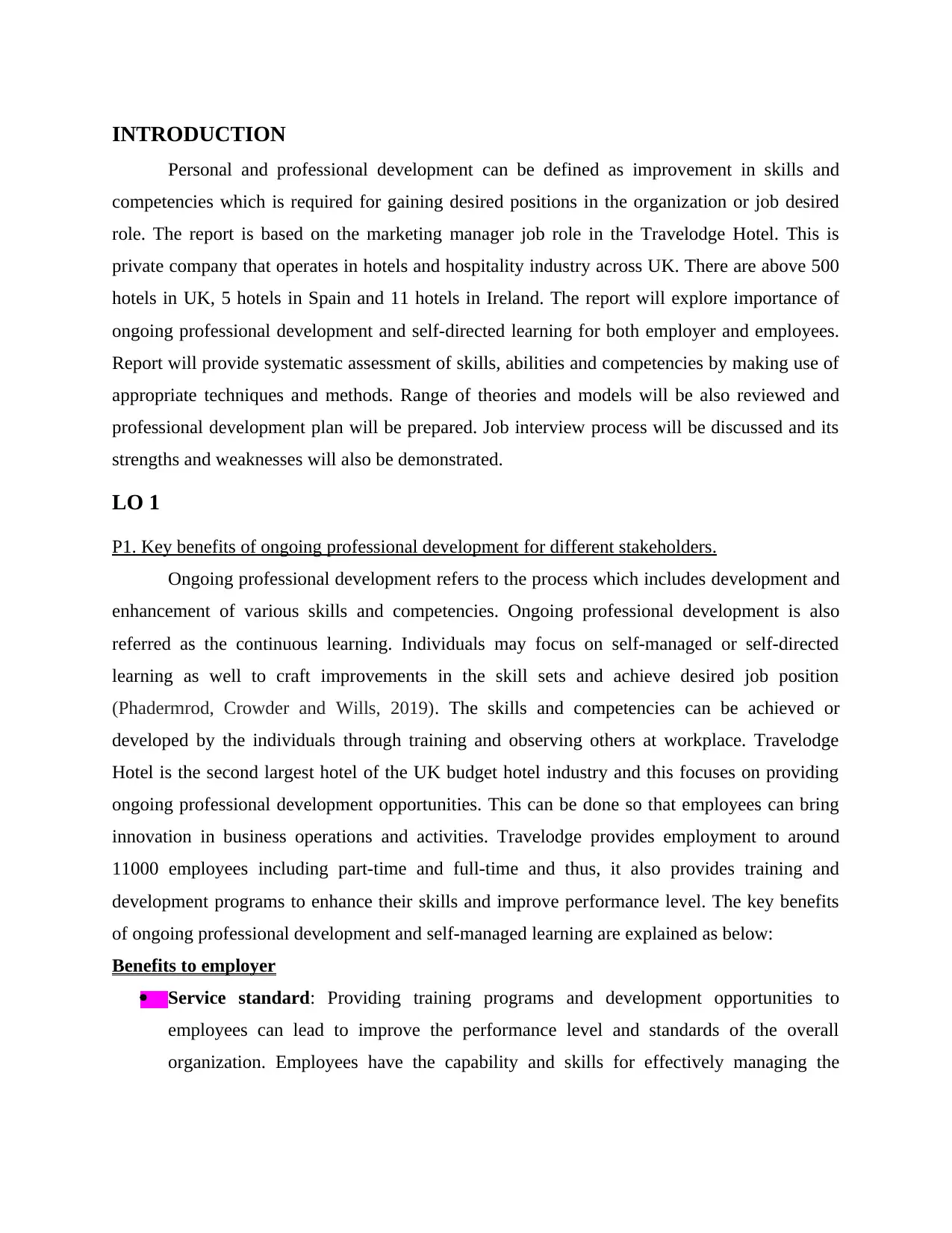
INTRODUCTION
Personal and professional development can be defined as improvement in skills and
competencies which is required for gaining desired positions in the organization or job desired
role. The report is based on the marketing manager job role in the Travelodge Hotel. This is
private company that operates in hotels and hospitality industry across UK. There are above 500
hotels in UK, 5 hotels in Spain and 11 hotels in Ireland. The report will explore importance of
ongoing professional development and self-directed learning for both employer and employees.
Report will provide systematic assessment of skills, abilities and competencies by making use of
appropriate techniques and methods. Range of theories and models will be also reviewed and
professional development plan will be prepared. Job interview process will be discussed and its
strengths and weaknesses will also be demonstrated.
LO 1
P1. Key benefits of ongoing professional development for different stakeholders.
Ongoing professional development refers to the process which includes development and
enhancement of various skills and competencies. Ongoing professional development is also
referred as the continuous learning. Individuals may focus on self-managed or self-directed
learning as well to craft improvements in the skill sets and achieve desired job position
(Phadermrod, Crowder and Wills, 2019). The skills and competencies can be achieved or
developed by the individuals through training and observing others at workplace. Travelodge
Hotel is the second largest hotel of the UK budget hotel industry and this focuses on providing
ongoing professional development opportunities. This can be done so that employees can bring
innovation in business operations and activities. Travelodge provides employment to around
11000 employees including part-time and full-time and thus, it also provides training and
development programs to enhance their skills and improve performance level. The key benefits
of ongoing professional development and self-managed learning are explained as below:
Benefits to employer
Service standard: Providing training programs and development opportunities to
employees can lead to improve the performance level and standards of the overall
organization. Employees have the capability and skills for effectively managing the
Personal and professional development can be defined as improvement in skills and
competencies which is required for gaining desired positions in the organization or job desired
role. The report is based on the marketing manager job role in the Travelodge Hotel. This is
private company that operates in hotels and hospitality industry across UK. There are above 500
hotels in UK, 5 hotels in Spain and 11 hotels in Ireland. The report will explore importance of
ongoing professional development and self-directed learning for both employer and employees.
Report will provide systematic assessment of skills, abilities and competencies by making use of
appropriate techniques and methods. Range of theories and models will be also reviewed and
professional development plan will be prepared. Job interview process will be discussed and its
strengths and weaknesses will also be demonstrated.
LO 1
P1. Key benefits of ongoing professional development for different stakeholders.
Ongoing professional development refers to the process which includes development and
enhancement of various skills and competencies. Ongoing professional development is also
referred as the continuous learning. Individuals may focus on self-managed or self-directed
learning as well to craft improvements in the skill sets and achieve desired job position
(Phadermrod, Crowder and Wills, 2019). The skills and competencies can be achieved or
developed by the individuals through training and observing others at workplace. Travelodge
Hotel is the second largest hotel of the UK budget hotel industry and this focuses on providing
ongoing professional development opportunities. This can be done so that employees can bring
innovation in business operations and activities. Travelodge provides employment to around
11000 employees including part-time and full-time and thus, it also provides training and
development programs to enhance their skills and improve performance level. The key benefits
of ongoing professional development and self-managed learning are explained as below:
Benefits to employer
Service standard: Providing training programs and development opportunities to
employees can lead to improve the performance level and standards of the overall
organization. Employees have the capability and skills for effectively managing the
⊘ This is a preview!⊘
Do you want full access?
Subscribe today to unlock all pages.

Trusted by 1+ million students worldwide
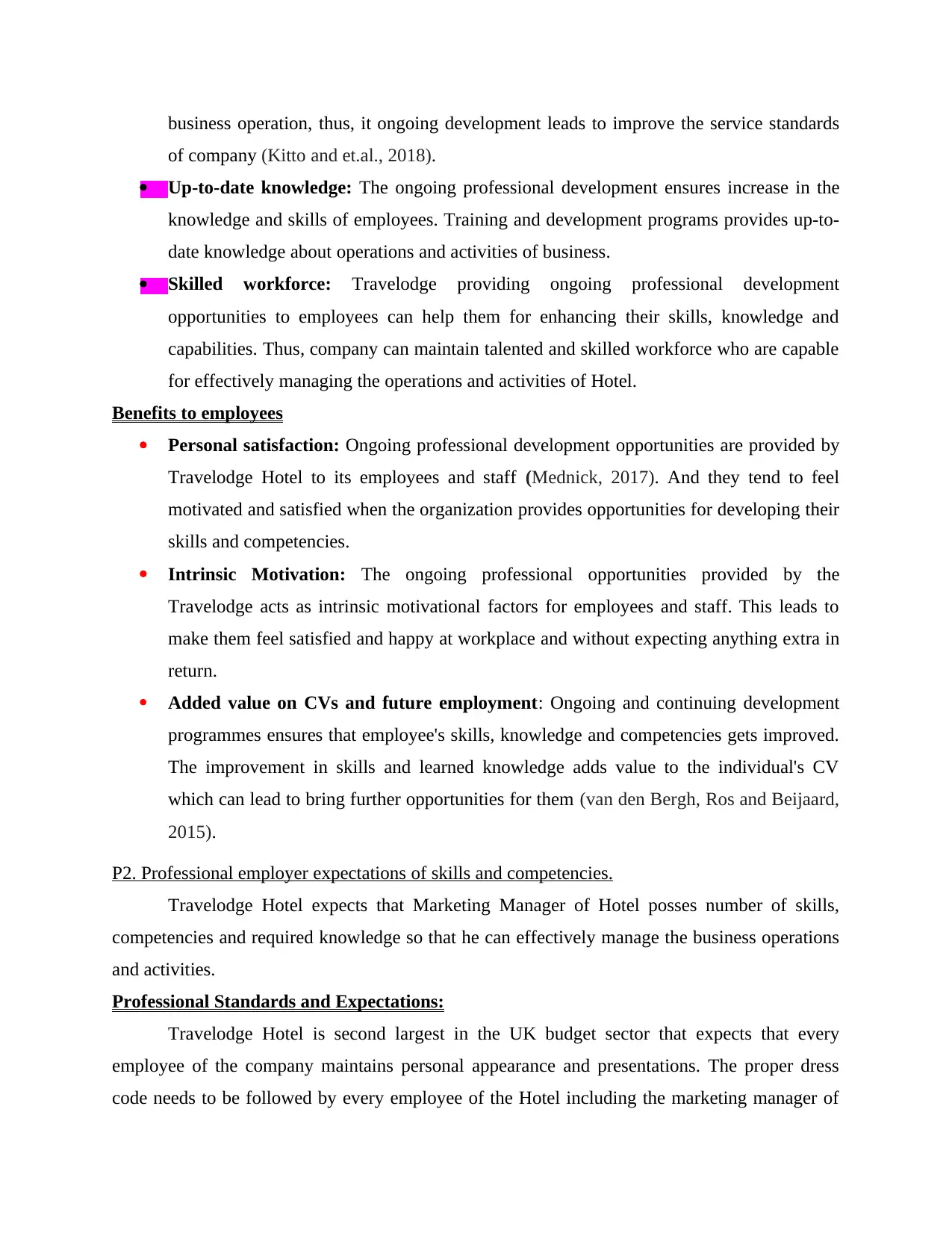
business operation, thus, it ongoing development leads to improve the service standards
of company (Kitto and et.al., 2018).
Up-to-date knowledge: The ongoing professional development ensures increase in the
knowledge and skills of employees. Training and development programs provides up-to-
date knowledge about operations and activities of business.
Skilled workforce: Travelodge providing ongoing professional development
opportunities to employees can help them for enhancing their skills, knowledge and
capabilities. Thus, company can maintain talented and skilled workforce who are capable
for effectively managing the operations and activities of Hotel.
Benefits to employees
Personal satisfaction: Ongoing professional development opportunities are provided by
Travelodge Hotel to its employees and staff (Mednick, 2017). And they tend to feel
motivated and satisfied when the organization provides opportunities for developing their
skills and competencies.
Intrinsic Motivation: The ongoing professional opportunities provided by the
Travelodge acts as intrinsic motivational factors for employees and staff. This leads to
make them feel satisfied and happy at workplace and without expecting anything extra in
return.
Added value on CVs and future employment: Ongoing and continuing development
programmes ensures that employee's skills, knowledge and competencies gets improved.
The improvement in skills and learned knowledge adds value to the individual's CV
which can lead to bring further opportunities for them (van den Bergh, Ros and Beijaard,
2015).
P2. Professional employer expectations of skills and competencies.
Travelodge Hotel expects that Marketing Manager of Hotel posses number of skills,
competencies and required knowledge so that he can effectively manage the business operations
and activities.
Professional Standards and Expectations:
Travelodge Hotel is second largest in the UK budget sector that expects that every
employee of the company maintains personal appearance and presentations. The proper dress
code needs to be followed by every employee of the Hotel including the marketing manager of
of company (Kitto and et.al., 2018).
Up-to-date knowledge: The ongoing professional development ensures increase in the
knowledge and skills of employees. Training and development programs provides up-to-
date knowledge about operations and activities of business.
Skilled workforce: Travelodge providing ongoing professional development
opportunities to employees can help them for enhancing their skills, knowledge and
capabilities. Thus, company can maintain talented and skilled workforce who are capable
for effectively managing the operations and activities of Hotel.
Benefits to employees
Personal satisfaction: Ongoing professional development opportunities are provided by
Travelodge Hotel to its employees and staff (Mednick, 2017). And they tend to feel
motivated and satisfied when the organization provides opportunities for developing their
skills and competencies.
Intrinsic Motivation: The ongoing professional opportunities provided by the
Travelodge acts as intrinsic motivational factors for employees and staff. This leads to
make them feel satisfied and happy at workplace and without expecting anything extra in
return.
Added value on CVs and future employment: Ongoing and continuing development
programmes ensures that employee's skills, knowledge and competencies gets improved.
The improvement in skills and learned knowledge adds value to the individual's CV
which can lead to bring further opportunities for them (van den Bergh, Ros and Beijaard,
2015).
P2. Professional employer expectations of skills and competencies.
Travelodge Hotel expects that Marketing Manager of Hotel posses number of skills,
competencies and required knowledge so that he can effectively manage the business operations
and activities.
Professional Standards and Expectations:
Travelodge Hotel is second largest in the UK budget sector that expects that every
employee of the company maintains personal appearance and presentations. The proper dress
code needs to be followed by every employee of the Hotel including the marketing manager of
Paraphrase This Document
Need a fresh take? Get an instant paraphrase of this document with our AI Paraphraser
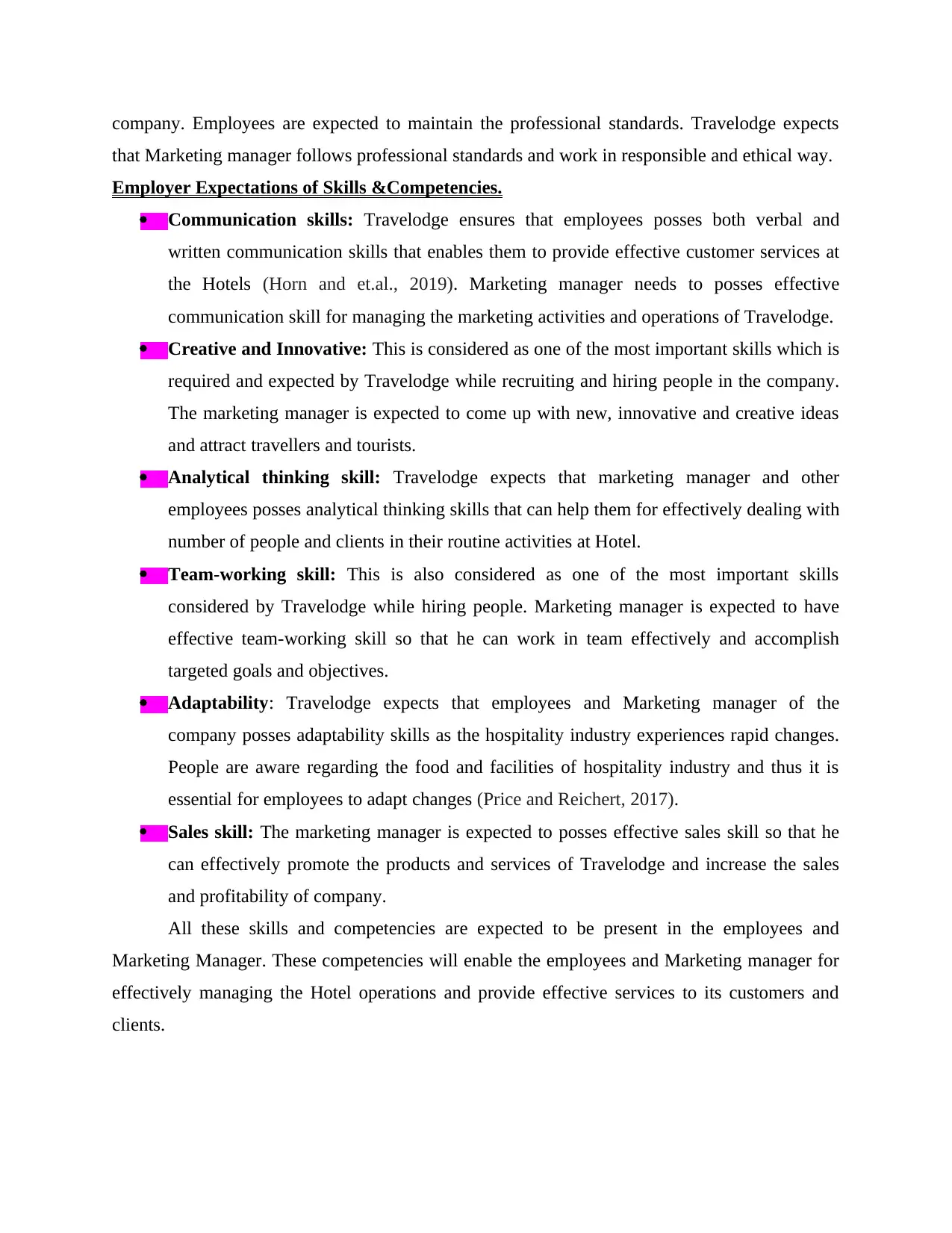
company. Employees are expected to maintain the professional standards. Travelodge expects
that Marketing manager follows professional standards and work in responsible and ethical way.
Employer Expectations of Skills &Competencies.
Communication skills: Travelodge ensures that employees posses both verbal and
written communication skills that enables them to provide effective customer services at
the Hotels (Horn and et.al., 2019). Marketing manager needs to posses effective
communication skill for managing the marketing activities and operations of Travelodge.
Creative and Innovative: This is considered as one of the most important skills which is
required and expected by Travelodge while recruiting and hiring people in the company.
The marketing manager is expected to come up with new, innovative and creative ideas
and attract travellers and tourists.
Analytical thinking skill: Travelodge expects that marketing manager and other
employees posses analytical thinking skills that can help them for effectively dealing with
number of people and clients in their routine activities at Hotel.
Team-working skill: This is also considered as one of the most important skills
considered by Travelodge while hiring people. Marketing manager is expected to have
effective team-working skill so that he can work in team effectively and accomplish
targeted goals and objectives.
Adaptability: Travelodge expects that employees and Marketing manager of the
company posses adaptability skills as the hospitality industry experiences rapid changes.
People are aware regarding the food and facilities of hospitality industry and thus it is
essential for employees to adapt changes (Price and Reichert, 2017).
Sales skill: The marketing manager is expected to posses effective sales skill so that he
can effectively promote the products and services of Travelodge and increase the sales
and profitability of company.
All these skills and competencies are expected to be present in the employees and
Marketing Manager. These competencies will enable the employees and Marketing manager for
effectively managing the Hotel operations and provide effective services to its customers and
clients.
that Marketing manager follows professional standards and work in responsible and ethical way.
Employer Expectations of Skills &Competencies.
Communication skills: Travelodge ensures that employees posses both verbal and
written communication skills that enables them to provide effective customer services at
the Hotels (Horn and et.al., 2019). Marketing manager needs to posses effective
communication skill for managing the marketing activities and operations of Travelodge.
Creative and Innovative: This is considered as one of the most important skills which is
required and expected by Travelodge while recruiting and hiring people in the company.
The marketing manager is expected to come up with new, innovative and creative ideas
and attract travellers and tourists.
Analytical thinking skill: Travelodge expects that marketing manager and other
employees posses analytical thinking skills that can help them for effectively dealing with
number of people and clients in their routine activities at Hotel.
Team-working skill: This is also considered as one of the most important skills
considered by Travelodge while hiring people. Marketing manager is expected to have
effective team-working skill so that he can work in team effectively and accomplish
targeted goals and objectives.
Adaptability: Travelodge expects that employees and Marketing manager of the
company posses adaptability skills as the hospitality industry experiences rapid changes.
People are aware regarding the food and facilities of hospitality industry and thus it is
essential for employees to adapt changes (Price and Reichert, 2017).
Sales skill: The marketing manager is expected to posses effective sales skill so that he
can effectively promote the products and services of Travelodge and increase the sales
and profitability of company.
All these skills and competencies are expected to be present in the employees and
Marketing Manager. These competencies will enable the employees and Marketing manager for
effectively managing the Hotel operations and provide effective services to its customers and
clients.
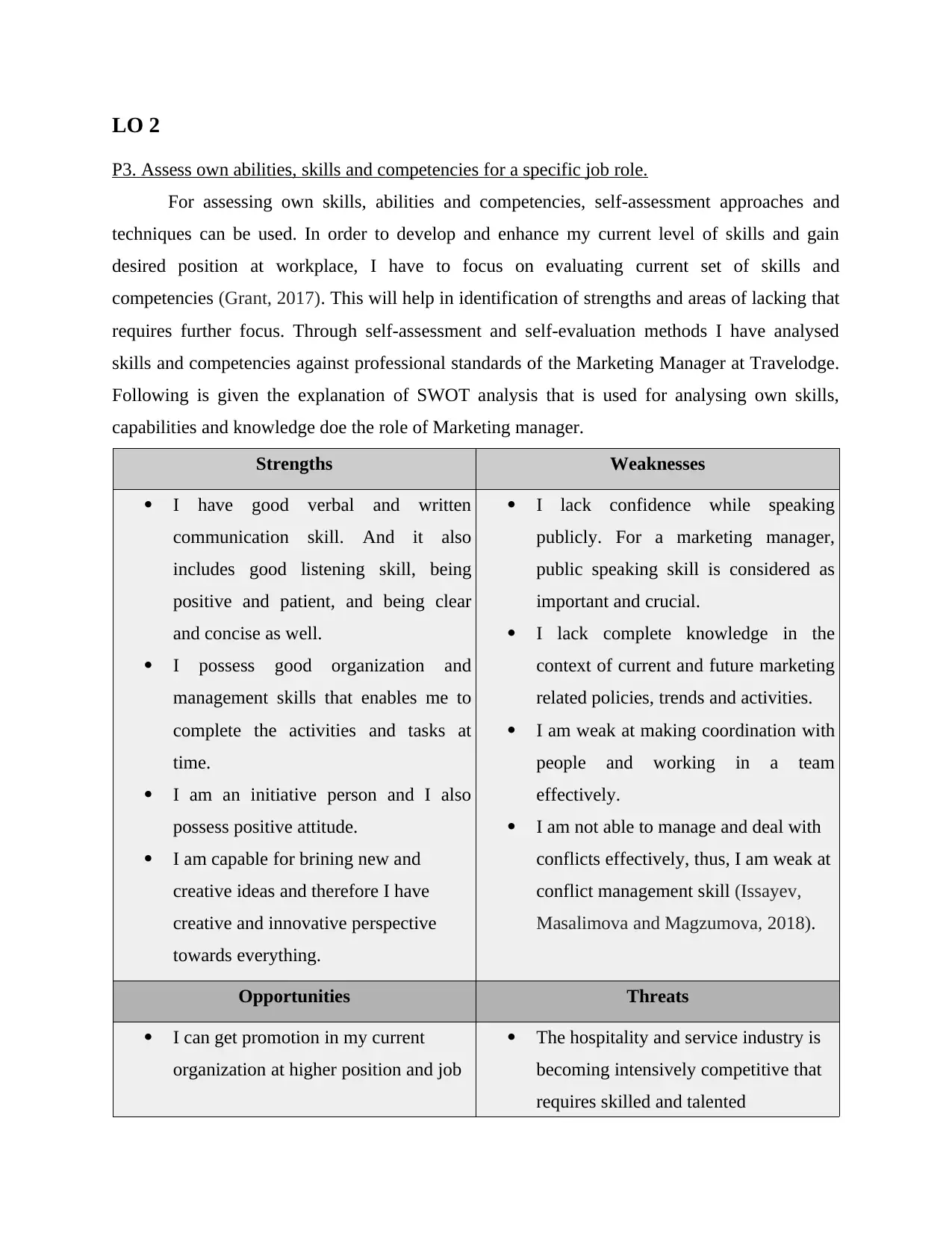
LO 2
P3. Assess own abilities, skills and competencies for a specific job role.
For assessing own skills, abilities and competencies, self-assessment approaches and
techniques can be used. In order to develop and enhance my current level of skills and gain
desired position at workplace, I have to focus on evaluating current set of skills and
competencies (Grant, 2017). This will help in identification of strengths and areas of lacking that
requires further focus. Through self-assessment and self-evaluation methods I have analysed
skills and competencies against professional standards of the Marketing Manager at Travelodge.
Following is given the explanation of SWOT analysis that is used for analysing own skills,
capabilities and knowledge doe the role of Marketing manager.
Strengths Weaknesses
I have good verbal and written
communication skill. And it also
includes good listening skill, being
positive and patient, and being clear
and concise as well.
I possess good organization and
management skills that enables me to
complete the activities and tasks at
time.
I am an initiative person and I also
possess positive attitude.
I am capable for brining new and
creative ideas and therefore I have
creative and innovative perspective
towards everything.
I lack confidence while speaking
publicly. For a marketing manager,
public speaking skill is considered as
important and crucial.
I lack complete knowledge in the
context of current and future marketing
related policies, trends and activities.
I am weak at making coordination with
people and working in a team
effectively.
I am not able to manage and deal with
conflicts effectively, thus, I am weak at
conflict management skill (Issayev,
Masalimova and Magzumova, 2018).
Opportunities Threats
I can get promotion in my current
organization at higher position and job
The hospitality and service industry is
becoming intensively competitive that
requires skilled and talented
P3. Assess own abilities, skills and competencies for a specific job role.
For assessing own skills, abilities and competencies, self-assessment approaches and
techniques can be used. In order to develop and enhance my current level of skills and gain
desired position at workplace, I have to focus on evaluating current set of skills and
competencies (Grant, 2017). This will help in identification of strengths and areas of lacking that
requires further focus. Through self-assessment and self-evaluation methods I have analysed
skills and competencies against professional standards of the Marketing Manager at Travelodge.
Following is given the explanation of SWOT analysis that is used for analysing own skills,
capabilities and knowledge doe the role of Marketing manager.
Strengths Weaknesses
I have good verbal and written
communication skill. And it also
includes good listening skill, being
positive and patient, and being clear
and concise as well.
I possess good organization and
management skills that enables me to
complete the activities and tasks at
time.
I am an initiative person and I also
possess positive attitude.
I am capable for brining new and
creative ideas and therefore I have
creative and innovative perspective
towards everything.
I lack confidence while speaking
publicly. For a marketing manager,
public speaking skill is considered as
important and crucial.
I lack complete knowledge in the
context of current and future marketing
related policies, trends and activities.
I am weak at making coordination with
people and working in a team
effectively.
I am not able to manage and deal with
conflicts effectively, thus, I am weak at
conflict management skill (Issayev,
Masalimova and Magzumova, 2018).
Opportunities Threats
I can get promotion in my current
organization at higher position and job
The hospitality and service industry is
becoming intensively competitive that
requires skilled and talented
⊘ This is a preview!⊘
Do you want full access?
Subscribe today to unlock all pages.

Trusted by 1+ million students worldwide
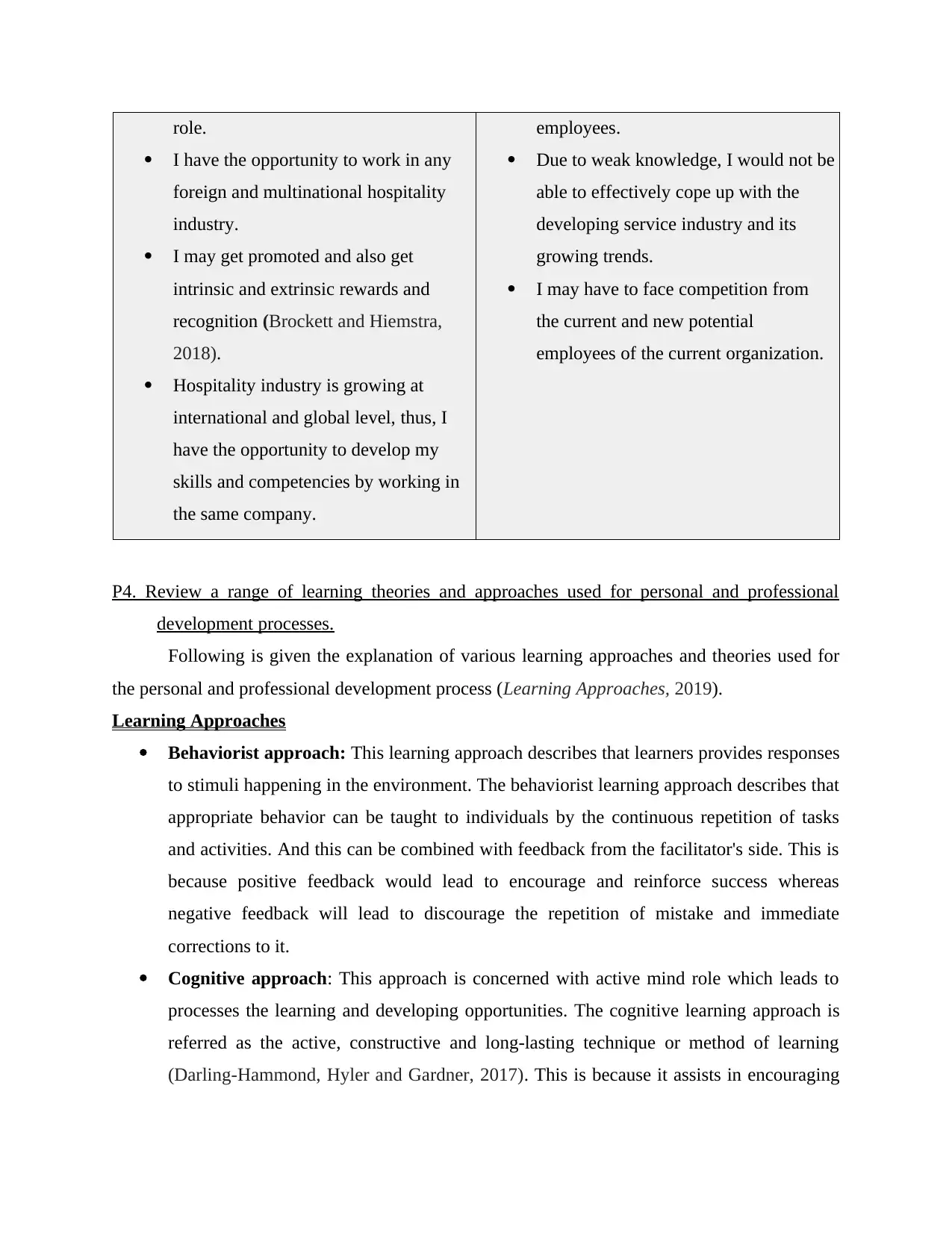
role.
I have the opportunity to work in any
foreign and multinational hospitality
industry.
I may get promoted and also get
intrinsic and extrinsic rewards and
recognition (Brockett and Hiemstra,
2018).
Hospitality industry is growing at
international and global level, thus, I
have the opportunity to develop my
skills and competencies by working in
the same company.
employees.
Due to weak knowledge, I would not be
able to effectively cope up with the
developing service industry and its
growing trends.
I may have to face competition from
the current and new potential
employees of the current organization.
P4. Review a range of learning theories and approaches used for personal and professional
development processes.
Following is given the explanation of various learning approaches and theories used for
the personal and professional development process (Learning Approaches, 2019).
Learning Approaches
Behaviorist approach: This learning approach describes that learners provides responses
to stimuli happening in the environment. The behaviorist learning approach describes that
appropriate behavior can be taught to individuals by the continuous repetition of tasks
and activities. And this can be combined with feedback from the facilitator's side. This is
because positive feedback would lead to encourage and reinforce success whereas
negative feedback will lead to discourage the repetition of mistake and immediate
corrections to it.
Cognitive approach: This approach is concerned with active mind role which leads to
processes the learning and developing opportunities. The cognitive learning approach is
referred as the active, constructive and long-lasting technique or method of learning
(Darling-Hammond, Hyler and Gardner, 2017). This is because it assists in encouraging
I have the opportunity to work in any
foreign and multinational hospitality
industry.
I may get promoted and also get
intrinsic and extrinsic rewards and
recognition (Brockett and Hiemstra,
2018).
Hospitality industry is growing at
international and global level, thus, I
have the opportunity to develop my
skills and competencies by working in
the same company.
employees.
Due to weak knowledge, I would not be
able to effectively cope up with the
developing service industry and its
growing trends.
I may have to face competition from
the current and new potential
employees of the current organization.
P4. Review a range of learning theories and approaches used for personal and professional
development processes.
Following is given the explanation of various learning approaches and theories used for
the personal and professional development process (Learning Approaches, 2019).
Learning Approaches
Behaviorist approach: This learning approach describes that learners provides responses
to stimuli happening in the environment. The behaviorist learning approach describes that
appropriate behavior can be taught to individuals by the continuous repetition of tasks
and activities. And this can be combined with feedback from the facilitator's side. This is
because positive feedback would lead to encourage and reinforce success whereas
negative feedback will lead to discourage the repetition of mistake and immediate
corrections to it.
Cognitive approach: This approach is concerned with active mind role which leads to
processes the learning and developing opportunities. The cognitive learning approach is
referred as the active, constructive and long-lasting technique or method of learning
(Darling-Hammond, Hyler and Gardner, 2017). This is because it assists in encouraging
Paraphrase This Document
Need a fresh take? Get an instant paraphrase of this document with our AI Paraphraser
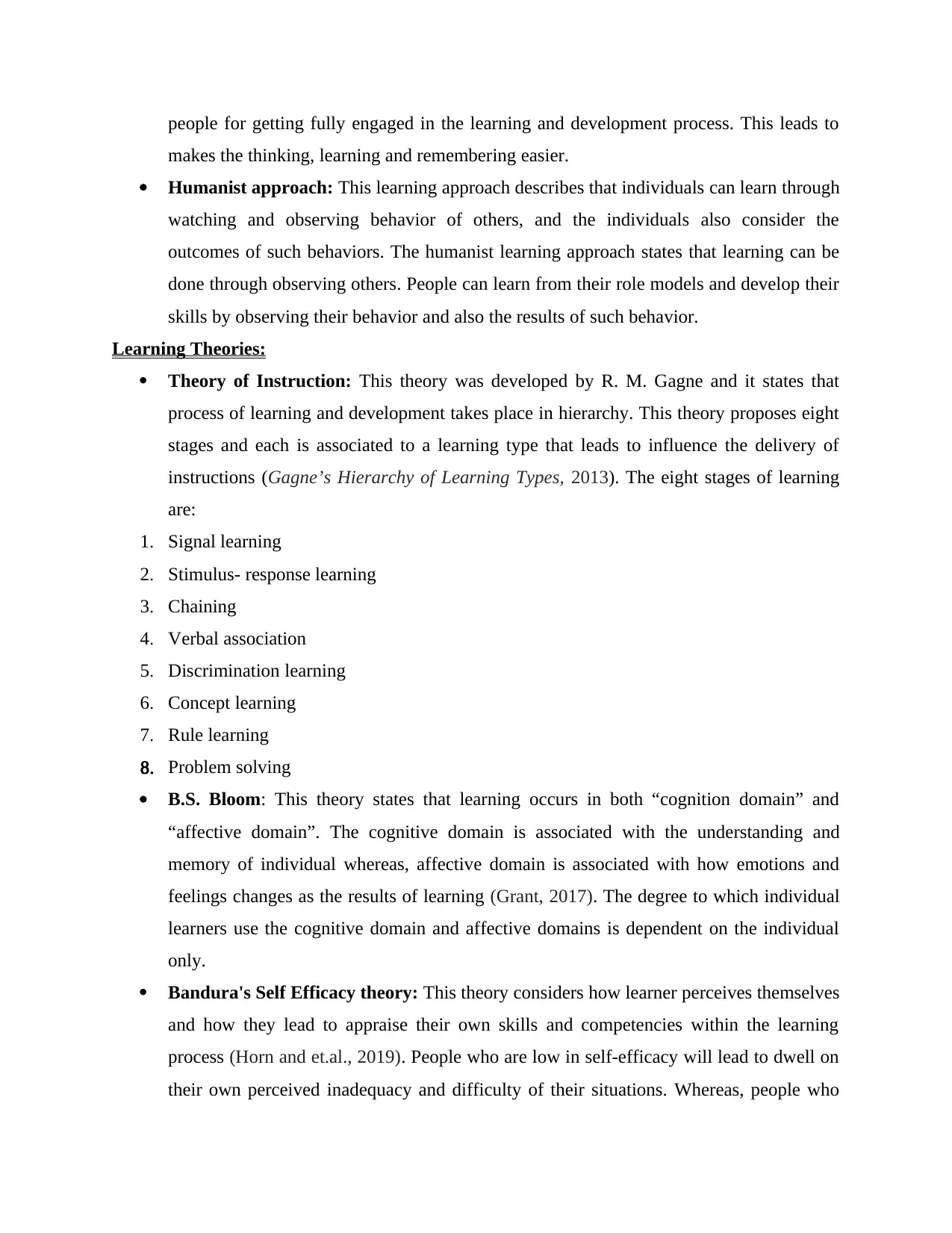
people for getting fully engaged in the learning and development process. This leads to
makes the thinking, learning and remembering easier.
Humanist approach: This learning approach describes that individuals can learn through
watching and observing behavior of others, and the individuals also consider the
outcomes of such behaviors. The humanist learning approach states that learning can be
done through observing others. People can learn from their role models and develop their
skills by observing their behavior and also the results of such behavior.
Learning Theories:
Theory of Instruction: This theory was developed by R. M. Gagne and it states that
process of learning and development takes place in hierarchy. This theory proposes eight
stages and each is associated to a learning type that leads to influence the delivery of
instructions (Gagne’s Hierarchy of Learning Types, 2013). The eight stages of learning
are:
1. Signal learning
2. Stimulus- response learning
3. Chaining
4. Verbal association
5. Discrimination learning
6. Concept learning
7. Rule learning
8. Problem solving
B.S. Bloom: This theory states that learning occurs in both “cognition domain” and
“affective domain”. The cognitive domain is associated with the understanding and
memory of individual whereas, affective domain is associated with how emotions and
feelings changes as the results of learning (Grant, 2017). The degree to which individual
learners use the cognitive domain and affective domains is dependent on the individual
only.
Bandura's Self Efficacy theory: This theory considers how learner perceives themselves
and how they lead to appraise their own skills and competencies within the learning
process (Horn and et.al., 2019). People who are low in self-efficacy will lead to dwell on
their own perceived inadequacy and difficulty of their situations. Whereas, people who
makes the thinking, learning and remembering easier.
Humanist approach: This learning approach describes that individuals can learn through
watching and observing behavior of others, and the individuals also consider the
outcomes of such behaviors. The humanist learning approach states that learning can be
done through observing others. People can learn from their role models and develop their
skills by observing their behavior and also the results of such behavior.
Learning Theories:
Theory of Instruction: This theory was developed by R. M. Gagne and it states that
process of learning and development takes place in hierarchy. This theory proposes eight
stages and each is associated to a learning type that leads to influence the delivery of
instructions (Gagne’s Hierarchy of Learning Types, 2013). The eight stages of learning
are:
1. Signal learning
2. Stimulus- response learning
3. Chaining
4. Verbal association
5. Discrimination learning
6. Concept learning
7. Rule learning
8. Problem solving
B.S. Bloom: This theory states that learning occurs in both “cognition domain” and
“affective domain”. The cognitive domain is associated with the understanding and
memory of individual whereas, affective domain is associated with how emotions and
feelings changes as the results of learning (Grant, 2017). The degree to which individual
learners use the cognitive domain and affective domains is dependent on the individual
only.
Bandura's Self Efficacy theory: This theory considers how learner perceives themselves
and how they lead to appraise their own skills and competencies within the learning
process (Horn and et.al., 2019). People who are low in self-efficacy will lead to dwell on
their own perceived inadequacy and difficulty of their situations. Whereas, people who
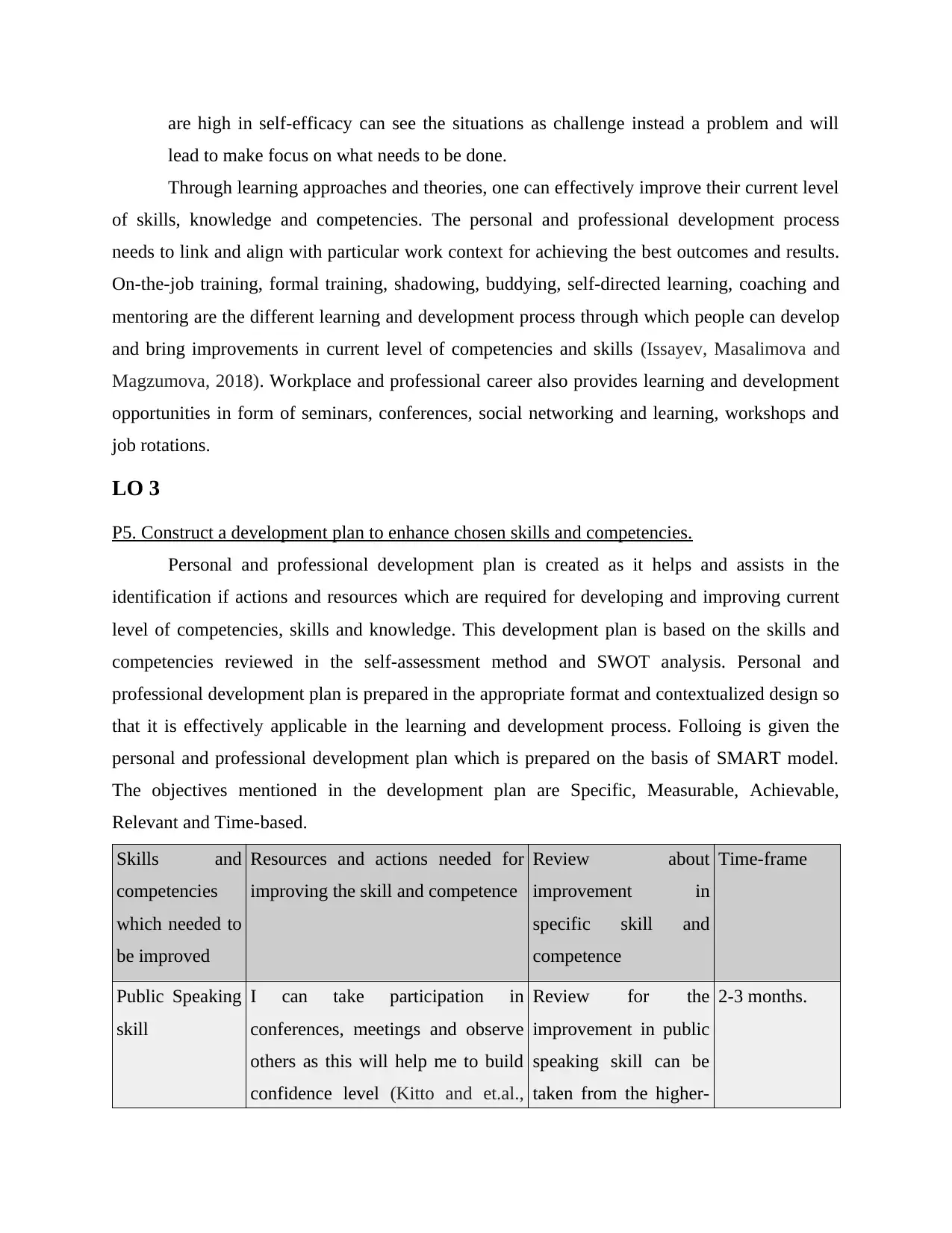
are high in self-efficacy can see the situations as challenge instead a problem and will
lead to make focus on what needs to be done.
Through learning approaches and theories, one can effectively improve their current level
of skills, knowledge and competencies. The personal and professional development process
needs to link and align with particular work context for achieving the best outcomes and results.
On-the-job training, formal training, shadowing, buddying, self-directed learning, coaching and
mentoring are the different learning and development process through which people can develop
and bring improvements in current level of competencies and skills (Issayev, Masalimova and
Magzumova, 2018). Workplace and professional career also provides learning and development
opportunities in form of seminars, conferences, social networking and learning, workshops and
job rotations.
LO 3
P5. Construct a development plan to enhance chosen skills and competencies.
Personal and professional development plan is created as it helps and assists in the
identification if actions and resources which are required for developing and improving current
level of competencies, skills and knowledge. This development plan is based on the skills and
competencies reviewed in the self-assessment method and SWOT analysis. Personal and
professional development plan is prepared in the appropriate format and contextualized design so
that it is effectively applicable in the learning and development process. Folloing is given the
personal and professional development plan which is prepared on the basis of SMART model.
The objectives mentioned in the development plan are Specific, Measurable, Achievable,
Relevant and Time-based.
Skills and
competencies
which needed to
be improved
Resources and actions needed for
improving the skill and competence
Review about
improvement in
specific skill and
competence
Time-frame
Public Speaking
skill
I can take participation in
conferences, meetings and observe
others as this will help me to build
confidence level (Kitto and et.al.,
Review for the
improvement in public
speaking skill can be
taken from the higher-
2-3 months.
lead to make focus on what needs to be done.
Through learning approaches and theories, one can effectively improve their current level
of skills, knowledge and competencies. The personal and professional development process
needs to link and align with particular work context for achieving the best outcomes and results.
On-the-job training, formal training, shadowing, buddying, self-directed learning, coaching and
mentoring are the different learning and development process through which people can develop
and bring improvements in current level of competencies and skills (Issayev, Masalimova and
Magzumova, 2018). Workplace and professional career also provides learning and development
opportunities in form of seminars, conferences, social networking and learning, workshops and
job rotations.
LO 3
P5. Construct a development plan to enhance chosen skills and competencies.
Personal and professional development plan is created as it helps and assists in the
identification if actions and resources which are required for developing and improving current
level of competencies, skills and knowledge. This development plan is based on the skills and
competencies reviewed in the self-assessment method and SWOT analysis. Personal and
professional development plan is prepared in the appropriate format and contextualized design so
that it is effectively applicable in the learning and development process. Folloing is given the
personal and professional development plan which is prepared on the basis of SMART model.
The objectives mentioned in the development plan are Specific, Measurable, Achievable,
Relevant and Time-based.
Skills and
competencies
which needed to
be improved
Resources and actions needed for
improving the skill and competence
Review about
improvement in
specific skill and
competence
Time-frame
Public Speaking
skill
I can take participation in
conferences, meetings and observe
others as this will help me to build
confidence level (Kitto and et.al.,
Review for the
improvement in public
speaking skill can be
taken from the higher-
2-3 months.
⊘ This is a preview!⊘
Do you want full access?
Subscribe today to unlock all pages.

Trusted by 1+ million students worldwide
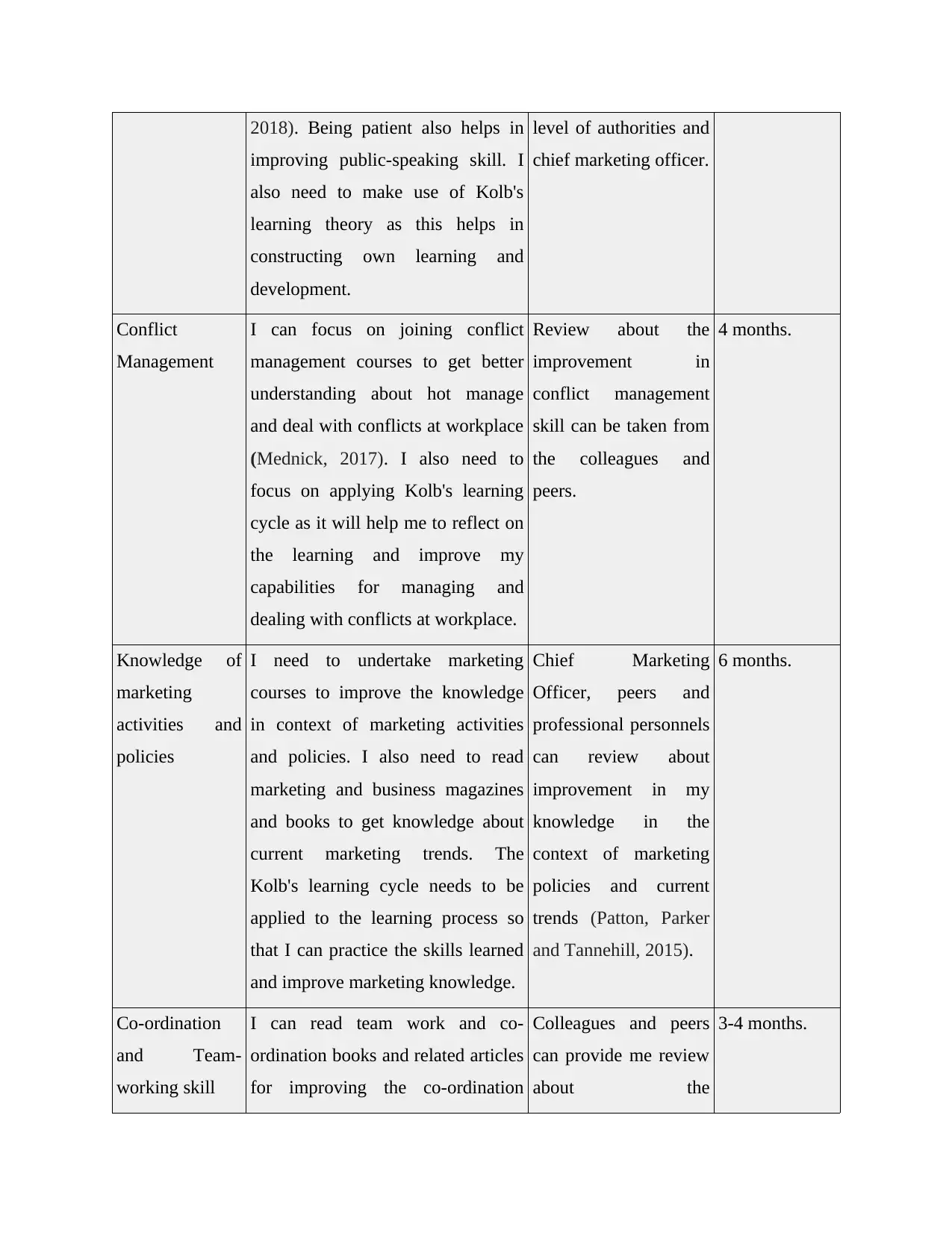
2018). Being patient also helps in
improving public-speaking skill. I
also need to make use of Kolb's
learning theory as this helps in
constructing own learning and
development.
level of authorities and
chief marketing officer.
Conflict
Management
I can focus on joining conflict
management courses to get better
understanding about hot manage
and deal with conflicts at workplace
(Mednick, 2017). I also need to
focus on applying Kolb's learning
cycle as it will help me to reflect on
the learning and improve my
capabilities for managing and
dealing with conflicts at workplace.
Review about the
improvement in
conflict management
skill can be taken from
the colleagues and
peers.
4 months.
Knowledge of
marketing
activities and
policies
I need to undertake marketing
courses to improve the knowledge
in context of marketing activities
and policies. I also need to read
marketing and business magazines
and books to get knowledge about
current marketing trends. The
Kolb's learning cycle needs to be
applied to the learning process so
that I can practice the skills learned
and improve marketing knowledge.
Chief Marketing
Officer, peers and
professional personnels
can review about
improvement in my
knowledge in the
context of marketing
policies and current
trends (Patton, Parker
and Tannehill, 2015).
6 months.
Co-ordination
and Team-
working skill
I can read team work and co-
ordination books and related articles
for improving the co-ordination
Colleagues and peers
can provide me review
about the
3-4 months.
improving public-speaking skill. I
also need to make use of Kolb's
learning theory as this helps in
constructing own learning and
development.
level of authorities and
chief marketing officer.
Conflict
Management
I can focus on joining conflict
management courses to get better
understanding about hot manage
and deal with conflicts at workplace
(Mednick, 2017). I also need to
focus on applying Kolb's learning
cycle as it will help me to reflect on
the learning and improve my
capabilities for managing and
dealing with conflicts at workplace.
Review about the
improvement in
conflict management
skill can be taken from
the colleagues and
peers.
4 months.
Knowledge of
marketing
activities and
policies
I need to undertake marketing
courses to improve the knowledge
in context of marketing activities
and policies. I also need to read
marketing and business magazines
and books to get knowledge about
current marketing trends. The
Kolb's learning cycle needs to be
applied to the learning process so
that I can practice the skills learned
and improve marketing knowledge.
Chief Marketing
Officer, peers and
professional personnels
can review about
improvement in my
knowledge in the
context of marketing
policies and current
trends (Patton, Parker
and Tannehill, 2015).
6 months.
Co-ordination
and Team-
working skill
I can read team work and co-
ordination books and related articles
for improving the co-ordination
Colleagues and peers
can provide me review
about the
3-4 months.
Paraphrase This Document
Need a fresh take? Get an instant paraphrase of this document with our AI Paraphraser
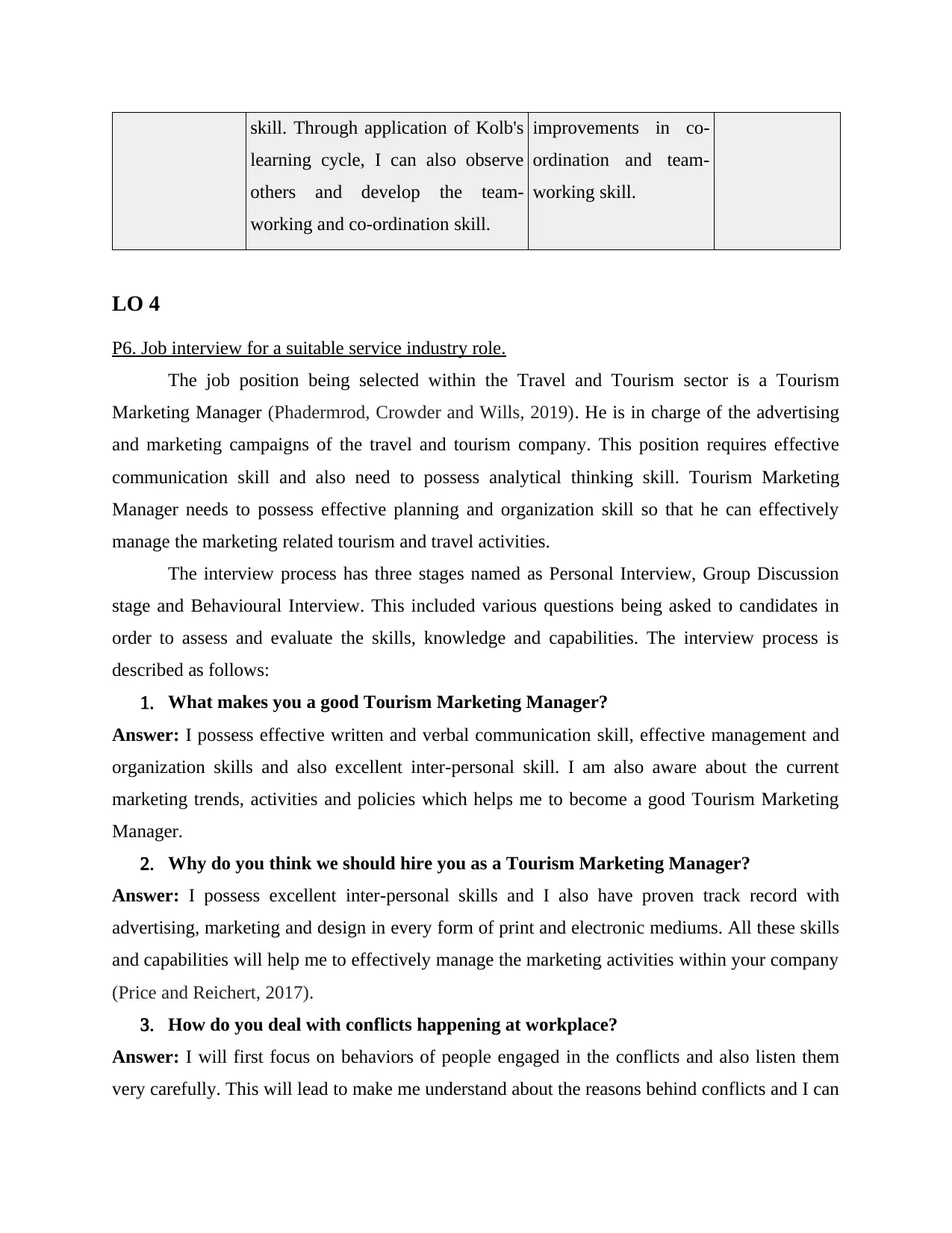
skill. Through application of Kolb's
learning cycle, I can also observe
others and develop the team-
working and co-ordination skill.
improvements in co-
ordination and team-
working skill.
LO 4
P6. Job interview for a suitable service industry role.
The job position being selected within the Travel and Tourism sector is a Tourism
Marketing Manager (Phadermrod, Crowder and Wills, 2019). He is in charge of the advertising
and marketing campaigns of the travel and tourism company. This position requires effective
communication skill and also need to possess analytical thinking skill. Tourism Marketing
Manager needs to possess effective planning and organization skill so that he can effectively
manage the marketing related tourism and travel activities.
The interview process has three stages named as Personal Interview, Group Discussion
stage and Behavioural Interview. This included various questions being asked to candidates in
order to assess and evaluate the skills, knowledge and capabilities. The interview process is
described as follows:
1. What makes you a good Tourism Marketing Manager?
Answer: I possess effective written and verbal communication skill, effective management and
organization skills and also excellent inter-personal skill. I am also aware about the current
marketing trends, activities and policies which helps me to become a good Tourism Marketing
Manager.
2. Why do you think we should hire you as a Tourism Marketing Manager?
Answer: I possess excellent inter-personal skills and I also have proven track record with
advertising, marketing and design in every form of print and electronic mediums. All these skills
and capabilities will help me to effectively manage the marketing activities within your company
(Price and Reichert, 2017).
3. How do you deal with conflicts happening at workplace?
Answer: I will first focus on behaviors of people engaged in the conflicts and also listen them
very carefully. This will lead to make me understand about the reasons behind conflicts and I can
learning cycle, I can also observe
others and develop the team-
working and co-ordination skill.
improvements in co-
ordination and team-
working skill.
LO 4
P6. Job interview for a suitable service industry role.
The job position being selected within the Travel and Tourism sector is a Tourism
Marketing Manager (Phadermrod, Crowder and Wills, 2019). He is in charge of the advertising
and marketing campaigns of the travel and tourism company. This position requires effective
communication skill and also need to possess analytical thinking skill. Tourism Marketing
Manager needs to possess effective planning and organization skill so that he can effectively
manage the marketing related tourism and travel activities.
The interview process has three stages named as Personal Interview, Group Discussion
stage and Behavioural Interview. This included various questions being asked to candidates in
order to assess and evaluate the skills, knowledge and capabilities. The interview process is
described as follows:
1. What makes you a good Tourism Marketing Manager?
Answer: I possess effective written and verbal communication skill, effective management and
organization skills and also excellent inter-personal skill. I am also aware about the current
marketing trends, activities and policies which helps me to become a good Tourism Marketing
Manager.
2. Why do you think we should hire you as a Tourism Marketing Manager?
Answer: I possess excellent inter-personal skills and I also have proven track record with
advertising, marketing and design in every form of print and electronic mediums. All these skills
and capabilities will help me to effectively manage the marketing activities within your company
(Price and Reichert, 2017).
3. How do you deal with conflicts happening at workplace?
Answer: I will first focus on behaviors of people engaged in the conflicts and also listen them
very carefully. This will lead to make me understand about the reasons behind conflicts and I can
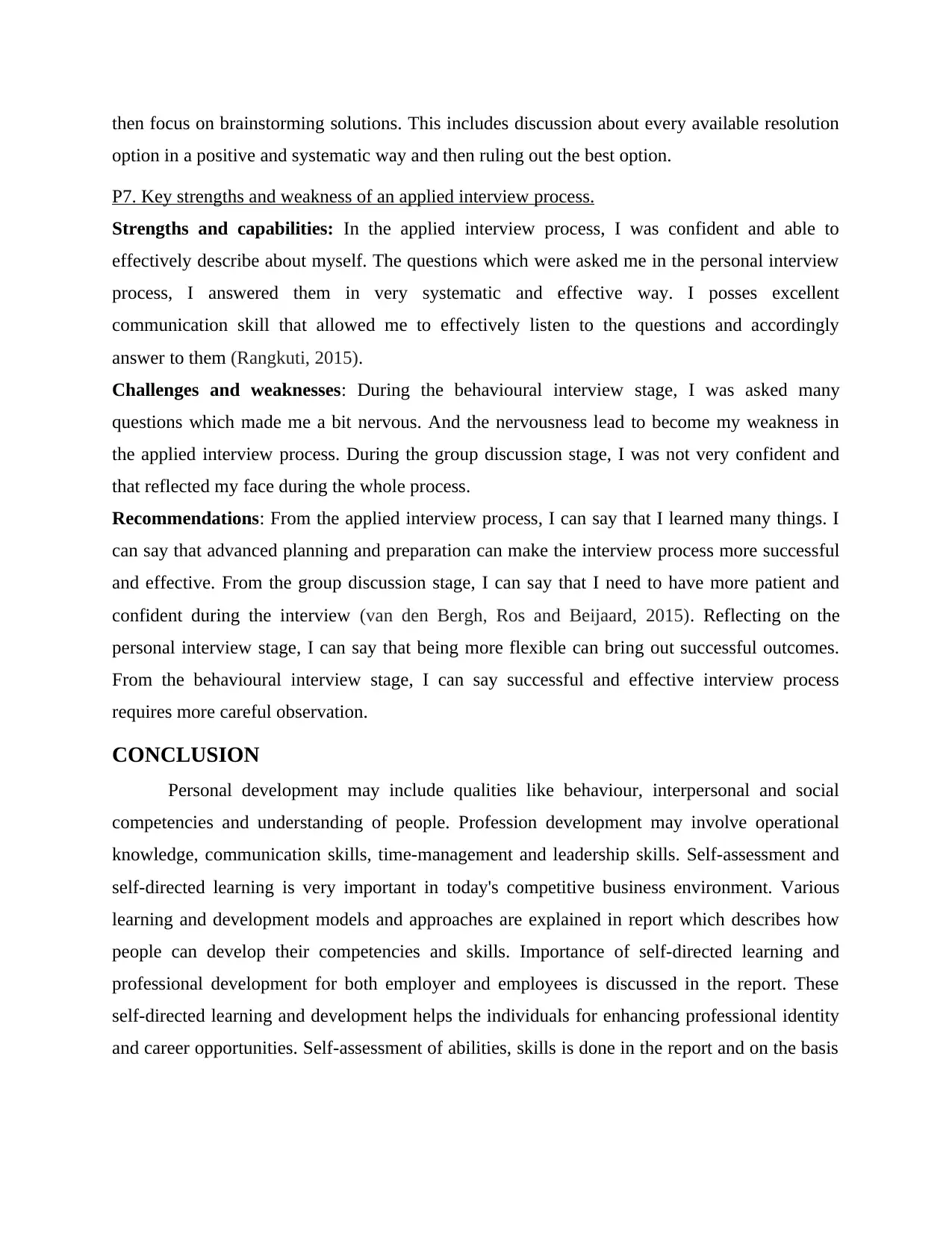
then focus on brainstorming solutions. This includes discussion about every available resolution
option in a positive and systematic way and then ruling out the best option.
P7. Key strengths and weakness of an applied interview process.
Strengths and capabilities: In the applied interview process, I was confident and able to
effectively describe about myself. The questions which were asked me in the personal interview
process, I answered them in very systematic and effective way. I posses excellent
communication skill that allowed me to effectively listen to the questions and accordingly
answer to them (Rangkuti, 2015).
Challenges and weaknesses: During the behavioural interview stage, I was asked many
questions which made me a bit nervous. And the nervousness lead to become my weakness in
the applied interview process. During the group discussion stage, I was not very confident and
that reflected my face during the whole process.
Recommendations: From the applied interview process, I can say that I learned many things. I
can say that advanced planning and preparation can make the interview process more successful
and effective. From the group discussion stage, I can say that I need to have more patient and
confident during the interview (van den Bergh, Ros and Beijaard, 2015). Reflecting on the
personal interview stage, I can say that being more flexible can bring out successful outcomes.
From the behavioural interview stage, I can say successful and effective interview process
requires more careful observation.
CONCLUSION
Personal development may include qualities like behaviour, interpersonal and social
competencies and understanding of people. Profession development may involve operational
knowledge, communication skills, time-management and leadership skills. Self-assessment and
self-directed learning is very important in today's competitive business environment. Various
learning and development models and approaches are explained in report which describes how
people can develop their competencies and skills. Importance of self-directed learning and
professional development for both employer and employees is discussed in the report. These
self-directed learning and development helps the individuals for enhancing professional identity
and career opportunities. Self-assessment of abilities, skills is done in the report and on the basis
option in a positive and systematic way and then ruling out the best option.
P7. Key strengths and weakness of an applied interview process.
Strengths and capabilities: In the applied interview process, I was confident and able to
effectively describe about myself. The questions which were asked me in the personal interview
process, I answered them in very systematic and effective way. I posses excellent
communication skill that allowed me to effectively listen to the questions and accordingly
answer to them (Rangkuti, 2015).
Challenges and weaknesses: During the behavioural interview stage, I was asked many
questions which made me a bit nervous. And the nervousness lead to become my weakness in
the applied interview process. During the group discussion stage, I was not very confident and
that reflected my face during the whole process.
Recommendations: From the applied interview process, I can say that I learned many things. I
can say that advanced planning and preparation can make the interview process more successful
and effective. From the group discussion stage, I can say that I need to have more patient and
confident during the interview (van den Bergh, Ros and Beijaard, 2015). Reflecting on the
personal interview stage, I can say that being more flexible can bring out successful outcomes.
From the behavioural interview stage, I can say successful and effective interview process
requires more careful observation.
CONCLUSION
Personal development may include qualities like behaviour, interpersonal and social
competencies and understanding of people. Profession development may involve operational
knowledge, communication skills, time-management and leadership skills. Self-assessment and
self-directed learning is very important in today's competitive business environment. Various
learning and development models and approaches are explained in report which describes how
people can develop their competencies and skills. Importance of self-directed learning and
professional development for both employer and employees is discussed in the report. These
self-directed learning and development helps the individuals for enhancing professional identity
and career opportunities. Self-assessment of abilities, skills is done in the report and on the basis
⊘ This is a preview!⊘
Do you want full access?
Subscribe today to unlock all pages.

Trusted by 1+ million students worldwide
1 out of 14
Related Documents
Your All-in-One AI-Powered Toolkit for Academic Success.
+13062052269
info@desklib.com
Available 24*7 on WhatsApp / Email
![[object Object]](/_next/static/media/star-bottom.7253800d.svg)
Unlock your academic potential
Copyright © 2020–2026 A2Z Services. All Rights Reserved. Developed and managed by ZUCOL.





